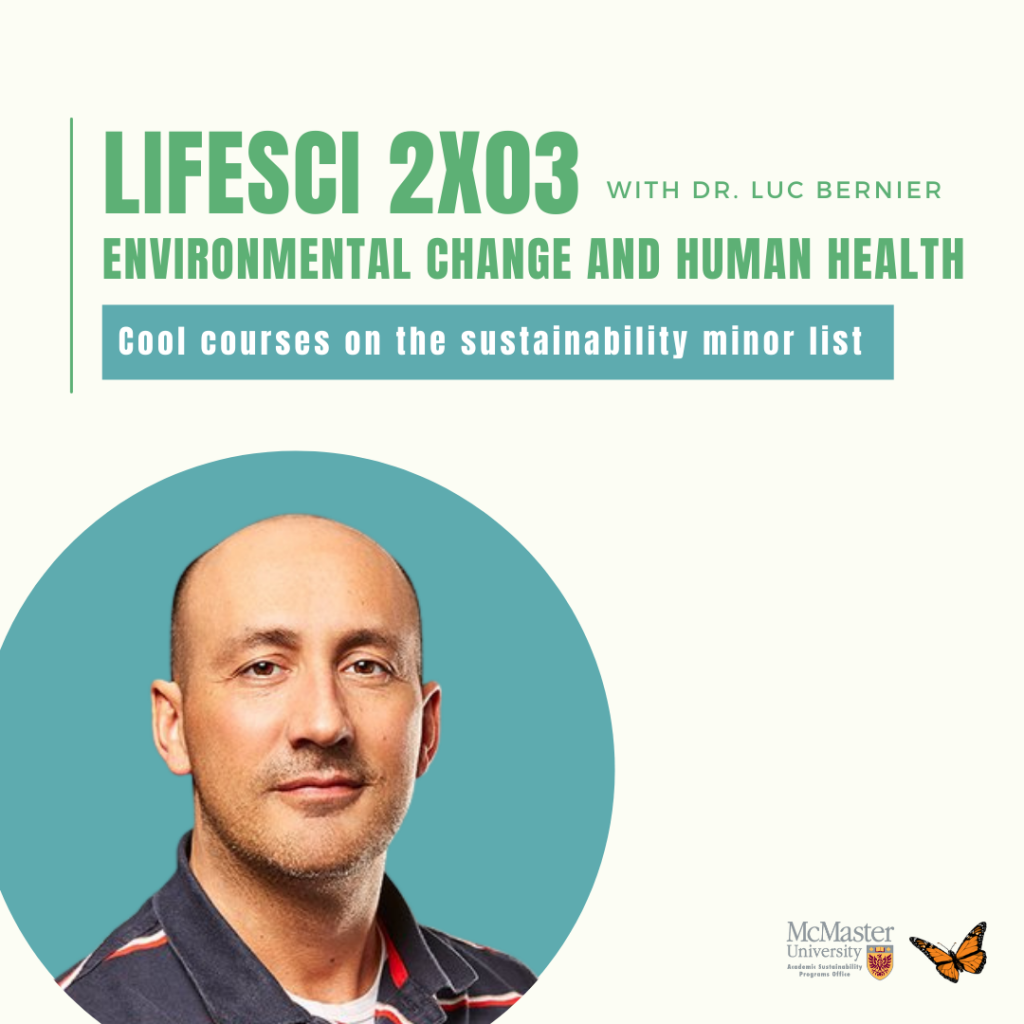Overview
Addressing sustainability in our society posts complex challenges that require interdisciplinary solutions. McMaster created the Interdisciplinary Minor in Sustainability with the goal to develop students’ interdisciplinary knowledge and understanding of sustainability. The scope and definition of sustainability used for the Minor are guided jointly by the United Nations Sustainable Development Goals and the Association for the Advancement of Sustainability in Higher Education (AASHE). In selecting our course list we have adopted AASHE’s definitions below:
To count as sustainability-focused, the course title or description must indicate a primary and explicit focus on sustainability as defined by the UN SDGs. This includes:
- Foundational courses with a primary and explicit focus on sustainability (e.g., Introduction to Sustainability, Sustainable Development, Sustainability Science).
- Courses with a primary and explicit focus on the application of sustainability within a field (e.g., Architecture for Sustainability, Green Chemistry, Sustainable Agriculture, Sustainable Business).
- As sustainability is an interdisciplinary topic, such courses generally incorporate insights from multiple disciplines.
- Courses with a primary and explicit focus on a major sustainability challenge (e.g., Climate Change Science, Environmental Justice, Global Poverty and Development, Renewable Energy Policy). The focus of such courses might be on providing knowledge and understanding of the problems and/or the tools for solving them.
The course title or description does not have to use the term “sustainability” to count as sustainability-focused if the primary and explicit focus of the course is on the interdependence of ecological and social/economic systems or a major sustainability challenge. If the course title and description do not unequivocally indicate such a focus, but it is evident from the course description or syllabus that the course incorporates sustainability challenges, issues, and concepts in a prominent way, the course may qualify as ‘sustainability-inclusive’.
NOTES
The following course(s) are part of the Minor Course List, but are not found within the Course Calendar:
- ART 3DP3 (dean’s permission, 2019/2020).
The following courses have been removed from the Minor Course List and can no longer be used towards an Interdisciplinary Minor in Sustainability:
- ANTHROP 2E03,
- BIOLOGY 2F03.
- ENGINEER 4A03
- PHILOS 2B03.
Students who have taken ANTHROP 2EO3, BIOLOGY 2F03, or PHILOS 2B03 in 2018/2019 or before, can still count those units towards their Minor in Sustainability. Students who have taken ENGINEER 4A03 in 2020/2021 or before can still count those units towards their Minor in Sustainability.
Students who took IBH 4AB6 are able to request substitution of 3 units.
Requirements
For the most up-to-date requirements, please visit the link to this year’s course calendar.
Expandable List
No more than 6 units from Level 1 courses
Any 3 units from the following list of SUSTAIN courses may count towards this requirement:
SUSTAIN 1S03 – Introduction to Sustainability;
SUSTAIN 2S03 – Evaluating Problems & Sustainable Solutions;
SUSTAIN 2lS3 – Intersectionality & Sustainable Development;
SUSTAIN 2SD3 – Exploring the United Nations Sustainable Development Goals;
SUSTAIN 3S03 – Implementing Sustainable Change;
SUSTAIN 4S06 – Leadership in Sustainability
Selected from two or more Faculties as outlined by the Interdisciplinary Minor in Sustainability Course list in the Undergraduate Calendar.
Any cross-listed course between two or more Faculties and those of interdisciplinary programs will be counted as a course outside of the student’s home Faculty. ENVIRSC and EARTHSC courses are administered by the Faculty of Science. ENVSOCTY and GEOG courses are counted as Social Sciences courses.
Sustain courses do not count towards units outside a student’s home Faculty.
NOTES
Student requests for course substitution can be completed using the request template and sent to Minor Committee Co-Chair Kate Whalen at whalenk@mcmaster.ca. The Request for Course Substitution template can be found at the appropriate tab above.
- Students should note that not all courses listed are available each year. As well, it is the student’s responsibility to check carefully for prerequisites, co-requisites and enrolment restrictions.
- Students are strongly encouraged to seek guidance from their academic advisor to ensure they are meeting all enrolment requirements, including Faculty-specific requirements for double counting courses required for a student’s major.
- All courses have enrolment capacities. The Faculty cannot guarantee enrolment in courses for minors, even when prerequisites have been met.
- ENVIRSC and EARTHSC courses are administered by the Faculty of Science.
- ENVSOCTY and GEOG courses are counted as Social Sciences courses.
Committee
Roles and Responsibilities
The roles and responsibilities of the Committee are as follows:
- Establish goals for the development and enhancement of the Minor and report annually on progress made
- Promote the Minor, including Sustain 1S03 and other courses on the Minor Course List
- Advise on the administrative processes involved, such as course exception process, course list, requirements, etc.
- Consult with Faculty colleagues on the course list and other administrative aspects
- Approve the course list, specifically for courses under each member’s home Faculty. Offer insight on courses outside home Faculty.
- Provide pan-campus perspective as it relates to development and management of the Minor
Guiding Principles
McMaster’s Minor in Sustainability is guided by the following principles:
- Provide students with foundational sustainability knowledge
- Create a consciousness and respect for the diversity of sustainability perspectives held in different Faculties
- Ensure an interdisciplinary educational experience
- Encourage and support student-directed learning
- Complement existing McMaster educational offerings while avoiding redundancy
- Ensure inter-Faculty equity, including student accessibility
Meeting Frequency
Twice annually in July and November
Membership – 2022/2023
| Member | Faculty | Department | Contact Information |
|---|---|---|---|
| Kate Whalen, Co-Chair | Academic Sustainability Programs Office | whalenk@mcmaster.ca | |
| Brent McKnight, Co-Chair | Business | Strategic Management | bmcknight@mcmaster.ca |
| Shelley Anderson, Academic Program Administrator | Arts & Science | Arts & Science | anderso@mcmaster.ca |
| Addisu Lashitew | Business | Strategic Management | lashitea@mcmaster.ca |
| Jim Cotton | Engineering | Mechanical Engineering | cottonjs@mcmaster.ca |
| Shelir Ebrahimi | Engineering | Chemical Engineering | shelir.ebrahimi@mcmaster.ca |
| Stacey Ritz | Health Sciences | Health Sciences | ritzsa@mcmaster.ca |
| Derek Woods | Humanities | Communications and Multimedia | woodsd11@mcmaster.ca |
| Susie O’Brien | Humanities | English and Cultural Studies | obriensu@mcmaster.ca |
| Luc Bernier | Science | Earth, Environment & Society | berniejm@univmail.cis.mcmaster.ca |
| Chad Harvey | Science | Integrated Science (iSci) Program | harvech@mcmaster.ca |
| Adrianne Lickers Xavier | Social Sciences | Indigenous Studies | xavier@mcmaster.ca |
| Aubrey Cannon | Social Sciences | Anthropology | cannona@mcmaster.ca |
Request Course Substitution
Students wishing to have a sustainability-related course, which is not currently on the Sustainability Minor Course List, and have it count towards their minor are encouraged to email asp@mcmaster.ca with the following information:
- Your Name:
- Your Home Faculty:
- Your Program of Study
- Level of Study:
- Faculty (of the course you are submitting the request for):
- Program (of the course you are submitting the request for):
- Course Code and Title:
- Course Outline (link or attach a copy):
- Name and Email of Course Instructor (who taught when you took the course):
- Have you had any other courses approved for substitutions?
- If yes, please list using Course Code and Title:
- Name of the academic advisor you have been working with in your home Faculty, if appropriate. If you haven’t been working with a specific advisor, that’s fine too.
- Describe how this course, and/or what you have done in this course, contributes to your learning about sustainability and your sustainability minor. Connecting your learning to one or more of the UN Sustainable Development Goals (see here or here) is encouraged. Additional information on each Sustainable Development Goal can be found by reading the associated Indicators and Targets.
Nominate a Cool Course
We are looking to hear from students about the cool course(s) you’ve taken that counts towards McMaster’s Interdisciplinary Minor in Sustainability. We want to share your favourites on our social media for others to see!
Expandable List
Nominated courses must meet the following requirements:
- Undergraduate course at McMaster
- Counts towards the Interdisciplinary Minor in Sustainability (see list here)
- Nominated by a student who has completed the course
If the course you want to nominate meets the criteria above, and you approve of us sharing the information you provide, please email asp@mcmaster.ca your response to the following:
1. Name of professor and course code you are nominating
2. Write a 1-2 sentence testimonial about why this course is cool and/or how it enhanced your sustainability education
3. Include your name, Faculty, and level of study
4. Provide us with your Facebook name and/or Instagram handle to be tagged (optional)
5. Provide us with a photo to be included in the post (optional)
After submitting your nomination, our team will connect with the professor and invite them to collaborate on a post by providing some more information about them and their course. Our team will create the social media graphic and content, have it approved by the student and professor, and post it on the @macsustain Instagram and Facebook accounts.
Check out a few Cool Courses that were nominated already!



Register for the Minor
Information Box Group
How to Register for the Minor Learn More
New for the Fall/Winter 2023-2024 academic year, students can now register for an Interdisciplinary Minor on Mosaic. A few benefits of registering for an Interdisciplinary Minor is you will learn about exciting new courses, discover unique opportunities associated with the minor, and connect with the minor administrators and faculty!
Note: You will still be required to declare your Interdisciplinary Minor at graduation.
Below are the steps to register for an Interdisciplinary Minor on Mosaic:
- Navigate to Student Centre through the Mosaic Homepage
- From the drop-down menu on the left-hand side, select “Service Requests”
- Click on “Create New Request”
- Select “Interdisciplinary Minor” and then hit “Next”
- Select “Interdisciplinary Minor in Sustainability” and then hit “Next”
- Press “Submit” (Note: You do not need to fill in the comment box)
Once submitted, you will be able to track the progress of your Interdisciplinary Minor registration through the Student Centre dropdown menu for “Service Request.”
If you have any questions, please contact asp@mcmaster.ca
Frequently Asked Questions (FAQs)
Expandable List
Minors are an opportunity to pursue and demonstrate your interests beyond your major. You can take a minor that is completely unrelated to your major.
The Interdisciplinary Minor in Sustainability is one of the top 5 minors declared at McMaster with over 300 students having achieved it. Sustainability poses complex challenges requiring interdisciplinary solutions. Learning through this model will help provide you with a unique learning experience helping you and your degree stand out.
Minors consist of 24.0 units (e.x., eight 3.0-unit courses)– no more than 6.0 units from Level I. Course requirements for the Minor are outlined in the Academic Calendar.
Students must complete 24 units from two or more Faculties, of which 3 units must be from a SUSTAIN course and no more than 6 units can be from Level I. There are over 85 courses to choose from across all Faculties. Course List can be found here.
A Minor is declared as you prepare for graduation. Here are the steps to follow to declare the minor:
1. Log into your Mosaic
2. Scroll down to “Minor/Certificate Application”
3. Select from the dropdown “Interdisciplinary Minor in Sustainability”
4. Enter the courses you have taken that count towards the Minor (24 units)
5. Review your details to confirm everything is accurate
6. Submit
The deadline to declare a Minor is May 31st, 2024. Here’s a helpful video to follow if you need more information! Click here to watch the video!
Students must complete 24 units from two or more Faculties, of which 3 units must be from a SUSTAIN course and no more than 6 units can be from Level I. There are over 85 courses to choose from across all Faculties. Course List can be found here.
There are currently 9 SUSTAIN courses offered. All the SUSTAIN courses are interdisciplinary, student-led, community-based and experiential with no exams. They vary in style and format. While 2S03 evaluates real-world problems and sustainable solutions by pursuing an individual lifestyle challenge.
SUSTAIN 2GS3 is asynchronous and self-guided and SUSTAIN 3S03 focuses on implementing sustainable change in the Hamilton community by working in groups with community partners.
